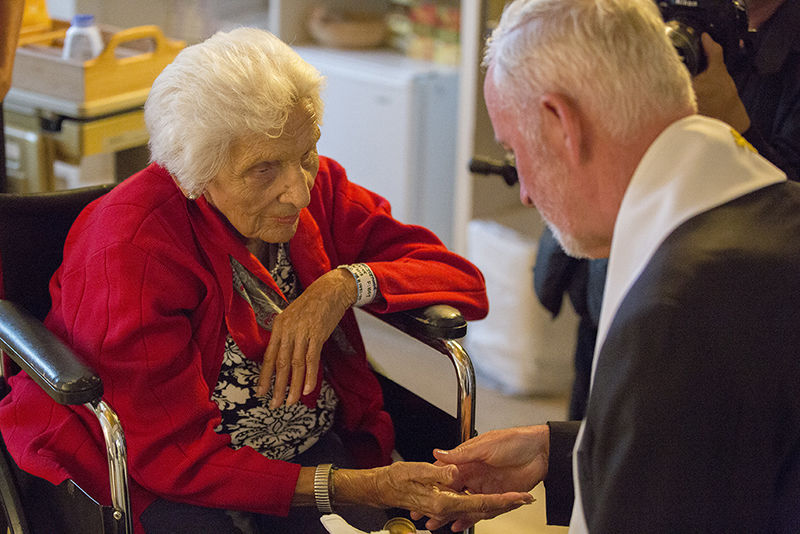Catholics throughout California were invoking St. Pope John Paul II during a novena, which ended June 9 — the day that the state’s assisted suicide law went into effect.
The prayer and fasting is being offered for a change of heart towards the elderly, the disabled and the terminally ill, according to kathleen-domingo, associate director of the archdiocesan Office of Life, Justice and Peace.
“One thing we have learned in the prolife movement in the last 40 years is that when you have a law that allows something as atrocious as abortion, the way to overcome those scourges to society is to get people to change their hearts and minds,” says Domingo.
Domingo says that Catholics need to be “encouraged to create a culture where assisted suicide is just not needed.” Catholics need to embrace caring for those at the end of life, ensuring that the elderly feel valued and not a burden, she says.
“No one needs to die alone. No one needs to die in pain. No one needs to feel that they are such a burden that their only option is to take their own life,” she says.
St. Pope John Paul II is the intercessor on end-of-life issues because of how he embraced his illness during the final years of his life. Although known for being photographed as healthy and charismatic, he also encouraged opportunities to show the world how frail he was becoming.
Sickness is never a sign of loss of dignity, Domingo says. “He really showed us that there is great dignity in suffering and embracing that and still living life to the fullest.”
On June 1, the Archdiocese of Los Angeles began the novena — a traditional Catholic prayer lasting nine days — with a Mass at Santa Teresita, a home for seniors in need of assisted living and nursing services, operated by the religious order of the Carmelite Sisters in Duarte.
Domingo acknowledges that California has a broken health care system. “We can’t deny that a lot of people die in pain, a lot of people die in the ICU, many people don’t die where they would like to — at home surrounded by family.” The novena’s launch at the Carmelite nursing home was an opportunity to show where end-of-life-care is properly carried out.
“It’s a place that really puts faith into action and really tells folks who are there that they are special and that they are being really cared for by people who love them,” Domingo says. “It’s a whole different mentality from other nursing homes that are maybe understaffed and stressed and [are places that] people don’t want to go to.”
Domingo wants the state of California to put money and resources into palliative care instead of allowing Medi-Cal to cover a dose of the lethal drug for assisted suicide — sold for as much as $5,400 per dose. Palliative care is more cost effective since the at-home medical care provides relief from the symptoms and stress of a serious illness, keeping patients out of the ICU and emergency room — two very expensive medical centers, she explains.
“Already California’s state budget has allocated $2.3 million through Medi-Cal to pay for drugs under the End of Life Option Act. So already it will be taxpayers who will be funding assisted suicide, but taxpayers’ funds do not go to cover palliative care,” she says.
However, another problem that became clear to Domingo during her fight against the legalization of euthanasia: many Catholics are unclear about the Church’s teachings on end-of-life issues.
She repeatedly heard the same questions from Catholics, many asking about the difference between assisted suicide and terminating treatment, and the definition of ordinary and extraordinary treatment.
Care and Prepare, a parish-based program, went into effect to answer these kinds of questions. The two-hour session lays out the Church’s teachings, the practical aspects of end-of-life care, provides stories on end-of-life from a hospital chaplain and suggests a “call to action.” A theologian gives the talk on the Church’s teachings, and a health care professional from Providence Healthcare addresses the practical aspects surrounding the issue.
Already 15 sessions have taken place at parishes across the Archdiocese of Los Angeles. More are scheduled to take place this fall at eight other parishes. Many participants are the elderly, looking to stay informed. Others are younger parishioners who are going to be caretakers for their parents and want to make informed decisions on their behalf.
Domingo’s favorite part of the session is the chaplain’s stories (in some cases, a religious sister will give the talk). “There is never a dry eye in the house. The stories they tell are wonderful and it makes you want to have that in your own life and for your own loved ones.”
She adds, “People can die well and well cared for. They can die surrounded by loved ones. It just takes a bit of planning and preparation.”
Care and Prepare
For more information about Care and Prepare or other information regarding end-of-life care, please visit archla.org/endoflife.

